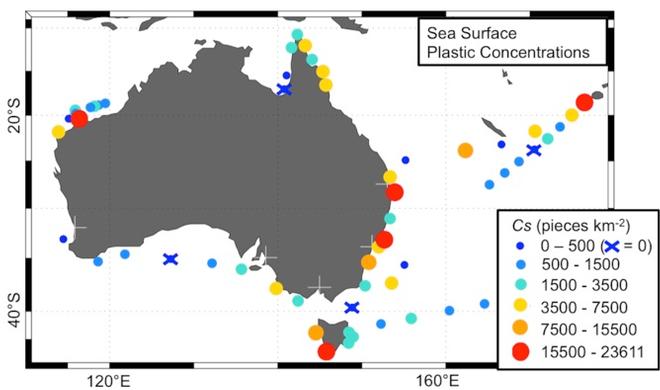New Australian study shows plastic pollution much worse than accepted
by Jeni Bone on 23 Dec 2013

Marine plastic concentrations in Australian waters SW
Plastic pollution in Australian waters is likely to be much worse than officially recognised, posing a threat to Australian species and ecology, according to the latest study published in journal PLOS ONE.
Each square kilometre of Australian sea surface water is contaminated by around 4,000 pieces of tiny plastics, according to researchers, Julia Reisser, Oceanographer and PhD candidate at the University of Western Australia and Charitha Pattiaratchi, Winthrop Professor of Coastal Oceanography at UWA.
These small plastic fragments, mostly less than 5mm across, are loaded with pollutants that can negatively affect several marine species, from tiny fish and zooplankton to large turtles and whales.
Plastics can be transported from populated areas to the marine environment by rivers, wind, tides, rainwater, storm drains, sewage disposal, and flooding, or can directly reach the sea from boats and offshore installations.
Throughout their marine journey, plastics break down into increasingly smaller pieces mostly due to the effect of sunlight and heat. These plastic fragments, commonly called microplastics when smaller than 5mm, represent the vast majority of human-made debris present at beaches, seafloor, and in the water column.
[Sorry, this content could not be displayed] The effects of plastics on food webs and ecosystems have become focus of concern over the last decade. It is now known that over half of our plastic objects contain at least one ingredient classified as hazardous.
To make matters worse, plastics that enter the oceans become increasingly toxic by adsorbing oily pollutants on their surface.
When plastic is ingested, these concentrated toxins can be delivered to animals and transferred up their food chains.
This biomagnification of toxins is more likely to occur when plastics are small enough to be ingested by low trophic fauna, such as small fish and zooplankton.
These tiny ocean plastics may affect the health of entire food webs, which include humans. For instance, little plastic pieces were found in the stomach of some Southern Bluefin tuna captured off Tasmania and destined for human consumption.
Until now, plastic contamination in Australian waters was mostly inferred from beach clean-up reports. There was no at-sea survey focused on sampling plastic debris in waters around this country.
Researchers used a net called Manta Net to catch floating plastics at the ocean surface. Small fragments of hard plastic were the most common type, but soft plastics, such as fragments of wrappers, and strings (mostly fishing lines) were also common.
Size and types of marine plastics collected around Australia. Examples of each plastic type are shown in the photos.
These plastics were mostly made of polyolefins (polyethylene and polypropylene). These polymers account for 52% of our plastic production and are typically used to make throwaway packaging. They are also used for manufacturing fishing equipment such as crates, nets, ropes, and lines.
Our overall mean sea surface plastic concentration was 4,256.4 plastic pieces per km2. This mean value is higher than those reported for other regions, such as the Caribbean Sea (1,414 pieces per km2) and Gulf of Maine (1,534 pieces per km2).
However, in the subtropical gyres, plastics tend to accumulate due to converging ocean currents, and mean plastic concentrations are higher: from 20,328 pieces per km2 in the North Atlantic Gyre, to 334,271 pieces per km2 in the North Pacific Gyre. The Mediterranean Sea is also a global hotspot for plastics: it has around 116,000 plastics per km2.
Researchers observed higher plastic concentrations close to major Australian cities (Sydney, Brisbane) and industrial centres (Karratha) as well as in remote areas where ocean currents converged (such as south-west Tasmania).
These observations, along with our ocean current modelling results, indicate that marine plastics reach Australian waters from multiple sources: domestic and international populated areas, as well as maritime operations.
Plastics, made mostly of oil and gas, are cheaper than the natural materials they replace for the manufacture of many objects, such as packaging and fishing gear.
As a result, incentives to re-use or recycle every-day items have decreased over the last few decades. Meanwhile plastic production has increased from 1,700,00 tonnes in 1950 to 280,000,000 tonnes in 2011.
In Australia, 1,476,690 tonnes of plastics were used in 2011-2012, of which just 20.5% was recycled. Most of these plastics (around 37%) were used for manufacturing single-use disposable packaging, including plastic bottles, cups, and bags.
Marine plastic pollution is a global issue caused by our massive production of plastic waste. The solution for this recent environmental problem is not simple.
Authors of the report believe there are three important steps. First, decrease plastic waste: this could be achieved by reducing production of single-use plastic packaging. Second, improve our plastic disposal practices on land at an international level. And last, better enforce the laws prohibiting dumping of plastics at sea.
More at www.plosone.org
If you want to link to this article then please use this URL: www.sail-world.com/117812